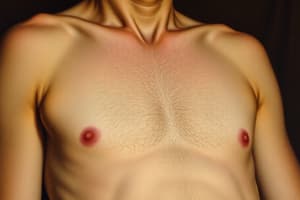Podcast
Questions and Answers
What characterizes primary hyperaldosteronism?
What characterizes primary hyperaldosteronism?
- Increased renin and decreased aldosterone
- Decreased renin and increased aldosterone (correct)
- Increased renin and increased aldosterone
- Normal renin and decreased aldosterone
What is the main consequence of impaired tetrahydrobiopterin synthesis?
What is the main consequence of impaired tetrahydrobiopterin synthesis?
- Increased synthesis of serotonin
- Decreased conversion of phenylalanine to tyrosine (correct)
- Increased conversion of phenylalanine to tryptophan
- Normal function of hydroxylase enzymes
Which condition presents with painless lower GI bleeding and anemia?
Which condition presents with painless lower GI bleeding and anemia?
- Spina bifida occulta
- Meckel diverticulum (correct)
- Nephrotic syndrome
- Tardive dyskinesia
How does aldosterone affect kidney function?
How does aldosterone affect kidney function?
Which nerve compression affects sensation over the palmar aspects of the first 3 1/2 digits?
Which nerve compression affects sensation over the palmar aspects of the first 3 1/2 digits?
What physiological change occurs in emphysema like alpha-1 antitrypsin deficiency?
What physiological change occurs in emphysema like alpha-1 antitrypsin deficiency?
What is the result of compression of the ulnar nerve at the guyon canal?
What is the result of compression of the ulnar nerve at the guyon canal?
What is the primary cause of edema in nephrotic syndrome?
What is the primary cause of edema in nephrotic syndrome?
What is the primary cause of hypoglycemia and vomiting after fructose ingestion in hereditary fructose intolerance?
What is the primary cause of hypoglycemia and vomiting after fructose ingestion in hereditary fructose intolerance?
Which artery supplies the lateral wall of the left ventricle?
Which artery supplies the lateral wall of the left ventricle?
Which of the following is a characteristic of niacin deficiency?
Which of the following is a characteristic of niacin deficiency?
In the presence of ADH, which part of the nephron contains the most concentrated fluid?
In the presence of ADH, which part of the nephron contains the most concentrated fluid?
What causes the symptoms seen in Potter sequence?
What causes the symptoms seen in Potter sequence?
What effect does the Diphtheria toxin have at the cellular level?
What effect does the Diphtheria toxin have at the cellular level?
What is the cause of normocytic anemia in patients with chronic kidney disease?
What is the cause of normocytic anemia in patients with chronic kidney disease?
Which vaccine primarily generates a strong cell-mediated immune response?
Which vaccine primarily generates a strong cell-mediated immune response?
Which condition is caused by a deletion of phenylalanine that leads to cystic fibrosis?
Which condition is caused by a deletion of phenylalanine that leads to cystic fibrosis?
What type of organism is Sporothrix schenckii?
What type of organism is Sporothrix schenckii?
What is the primary metabolic role of niacin in the body?
What is the primary metabolic role of niacin in the body?
What is the most common presentation of Niemann Pick disease due to sphingomyelinase deficiency?
What is the most common presentation of Niemann Pick disease due to sphingomyelinase deficiency?
Which of the following mechanisms leads to overfilling in the heart due to primary renal defects?
Which of the following mechanisms leads to overfilling in the heart due to primary renal defects?
What is the pathophysiological mechanism involved in adjustment disorder?
What is the pathophysiological mechanism involved in adjustment disorder?
Flashcards are hidden until you start studying
Study Notes
Hyperaldosteronism
- Primary hyperaldosteronism is characterized by decreased renin and increased aldosterone levels. This is usually caused by an aldosterone-producing adrenal tumor or adrenal hyperplasia.
- Secondary hyperaldosteronism involves increased renin and aldosterone levels. This is often due to a juxtaglomerular cell tumor.
Cellular Biology
- The rough endoplasmic reticulum (ER) is covered in ribosomes and plays a crucial role in the synthesis of cell membrane proteins.
Meckel Diverticulum
- Meckel diverticulum arises from an incomplete closure of the vitelline duct.
- It can manifest as painless lower gastrointestinal bleeding and anemia.
Tardive Dyskinesia
- Tardive dyskinesia (TD) involves abnormal involuntary movements in the tongue, face, extremities, or trunk.
- It’s a potential side effect of prolonged exposure to antipsychotic medications.
Cardiac Physiology
- Capillary venous pressure is a measure of right-sided preload in the heart.
- Pulmonary capillary wedge pressure reflects left-sided preload.
Spina Bifida Occulta
- Spina bifida occulta is a type of closed neural tube defect where the vertebral arches fail to fuse completely.
- It can present with a tuft of hair at the affected site.
Adenosine Deaminase (ADA) Deficiency
- Adenosine deaminase (ADA) deficiency is a severe combined immunodeficiency disease.
- This is due to inherited gene mutations leading to an autosomal recessive inheritance pattern.
- ADA inhibition is highly lymphocytotoxic. Medications targeting ADA are used in treating lymphocyte-derived cancers.
Tetrahydrobiopterin (H4) Deficiency
- Impaired tetrahydrobiopterin (H4) synthesis disrupts the conversion of phenylalanine to tyrosine.
- H4 is an essential cofactor for phenylalanine hydroxylase.
- H4 acts as a cofactor for hydroxylase enzymes involved in the synthesis of essential neurotransmitters (e.g., dopamine and serotonin).
Nerve Compression Syndromes
- Median nerve compression between the two heads of the pronator teres muscle can cause sensory loss in the palmar aspects of the first 3.5 digits and the thenar eminence.
- Ulnar nerve compression can occur at the medial epicondyle (funny bone) and the olecranon (in the cubital tunnel).
- It can also happen distally at the wrist as the nerve passes through the Guyon canal (between the hook of the hamate and pisiform bone). Compression at the Guyon canal can lead to numbness in the medial 1.5 digits.
- Deep branch of the radial nerve compression in the upper forearm (between the supinator muscle and radial head) can cause sensory loss on the posterior forearm.
Emphysema
- Emphysema (such as in alpha-1 antitrypsin deficiency) results in increased lung compliance.
- This is reflected in a steeper slope of the pressure-volume curve.
Hormones & Their Effects
- Antidiuretic hormone (ADH) signals the kidneys to conserve water and produce concentrated urine.
- Aldosterone promotes sodium reabsorption as part of the renin-angiotensin-aldosterone system (RAAS).
Nephrotic Syndrome
- Edema in nephrotic syndrome is a complex process.
- It involves both "underfilling" and "overfilling."
- Underfilling results from hypoalbuminemia, which lowers plasma oncotic pressure, leading to sodium retention.
- Overfilling occurs due to primary defects in renal sodium handling.
Meningococcal Disease Prophylaxis
- Rifampin is the most frequently used agent for chemoprophylaxis of meningococcal disease.
Fructose Metabolism Disorders
- Fructokinase deficiency (essential fructosuria) is asymptomatic.
- Fructose is excreted in the urine.
- Hexokinase takes over fructose metabolism, converting fructose to fructose-6-phosphate.
- Hereditary fructose intolerance is characterized by hypoglycemia, vomiting, and growth failure after fructose ingestion.
- It's caused by a deficiency of aldolase B, leading to an accumulation of fructose-1-phosphate.
Cystic Fibrosis
- Cystic fibrosis often involves a deletion of phenylalanine.
- This mutation affects the post-translational processing of a transmembrane protein.
- Lumacaftor can partially correct this defect.
Coronary Arteries and Supply
- Left main coronary artery: Divides into the left anterior descending (LAD) and left circumflex (LCx) arteries.
- Left Anterior Descending (LAD): Supplies the anterior wall of the left ventricle, anterior interventricular septum, and apex of the heart.
- Left Circumflex (LCx): Supplies the lateral wall of the left ventricle, left atrium, and sometimes the posterior wall of the left ventricle (in cases of left dominance).
- Right Coronary Artery (RCA): Supplies the right atrium, right ventricle, inferior wall of the left ventricle, and posterior interventricular septum (in right-dominant individuals).
Potter Sequence
- Potter sequence is a constellation of birth defects including flat facies, pulmonary hypoplasia, and limb deformities.
- It's caused by urinary tract anomalies that lead to decreased fetal urine production (oligohydramnios).
- Bilateral renal agenesis is a common association.
Adjustment Disorder
- Adjustment disorder involves emotional or behavioral symptoms that develop within 3 months of an identifiable stressor.
- Diagnosis is given when an individual experiences significant distress and impairment but doesn't meet the full criteria for another mental disorder.
Sporothrix schenckii Infections
- Sporothrix schenckii is a dimorphic fungus found in decaying plant matter.
- It exists as yeasts at body temperature.
- Sporotrichosis presents as a non-painful nodular lymphangitis that progresses proximally along the lymphatic chain.
Cancer Immunotherapy
- Tumors with defective DNA mismatch repair generate high levels of neoantigens.
- These tumors rely on mechanisms to escape cytotoxic T cell destruction.
- Immune checkpoint inhibitors are used to target these mechanisms and enhance the immune response against the tumors.
Annular Pancreas
- Annular pancreas involves pancreatic tissue encircling the duodenum.
- It occurs due to abnormal rotation of the ventral pancreatic bud.
- This condition can cause intestinal obstruction and bilious emesis.
Nephron Fluid Concentration
- In the presence of ADH, the collecting ducts contain the most concentrated fluid within the nephron.
- The distal convoluted tubule (DCT) has the most dilute fluid.
Viral Vaccines
- Inactivated viral vaccines mainly trigger a humoral immune response against extracellular viral antigens, preventing viral entry into cells.
- Live attenuated viral vaccines produce a strong cell-mediated immune response that can kill virally infected cells.
Oculocutaneous Albinism
- Oculocutaneous albinism is an autosomal recessive disorder of melanin biosynthesis.
- It's caused by defective tyrosinase activity.
Ornithine Transcarbamylase Deficiency
- Ornithine transcarbamylase deficiency is a urea cycle disorder characterized by hyperammonemia and encephalopathy.
- Symptoms include vomiting, lethargy, and seizures.
Niemann Pick Disease
- Niemann Pick disease is a lysosomal storage disorder caused by sphingomyelinase deficiency.
- It leads to progressive neurodegeneration and hepatosplenomegaly.
- A characteristic "cherry-red macula" is seen.
Hepatitis C Virus
- Hepatitis C virus (HCV) is genetically unstable due to the lack of proofreading 3' to 5' exonuclease activity in its RNA polymerase.
Interferon-Gamma Signaling Defects
- Inherited defects in the interferon-gamma signaling pathway result in disseminated mycobacterial disease in infancy or early childhood.
Niacin (Vitamin B3)
- Niacin is a precursor for nicotinamide adenine dinucleotide (NAD) and nicotinamide adenine dinucleotide phosphate (NADP).
- NAD is essential for the activity of key enzymes involved in the citric acid cycle: isocitrate dehydrogenase, alpha-ketoglutarate dehydrogenase, and malate dehydrogenase.
Niacin Deficiency
- Niacin deficiency leads to pellagra, characterized by the "three D's": diarrhea, dementia, and dermatitis.
Chronic Kidney Disease and Anemia
- Patients with chronic kidney disease often develop normocytic anemia.
- This is due to inflammatory damage to renal erythropoietin (EPO)-producing cells, leading to insufficient EPO production.
Erythropoietin (EPO)
- EPO is produced by peritubular fibroblasts in the renal cortex.
- Its production is stimulated by decreased renal oxygen delivery.
Diphtheria
- Toxigenic strains of Corynebacterium diphtheriae produce diphtheria toxin.
- This toxin irreversibly inhibits host protein synthesis by ADP-ribosylating elongation factor 2.
- Myocarditis and neuritis are common complications.
- Immunization with diphtheria toxoid generates protective circulating IgG antibodies against the toxin's B subunit.
Intestinal Atresia
- Intestinal atresia involving the bowel segment distal to the duodenum occurs due to vascular occlusion in utero.
- Superior mesenteric artery (SMA) occlusion leads to ischemia of the jejunum and ileum.
- This can result in a blind-ending proximal jejunum and a distal ileum that spirals around the ileocolic vessel (apple peel atresia).
Studying That Suits You
Use AI to generate personalized quizzes and flashcards to suit your learning preferences.




